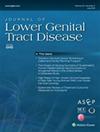在 MSMLWH 群体中,HPV33、HPV35 和 HPV56 与肛门 HSIL 之间存在统计学意义上的显著关联。
IF 2.1
4区 医学
Q2 OBSTETRICS & GYNECOLOGY
引用次数: 0
摘要
目的:本研究旨在确定与其他男性发生性行为的男性艾滋病感染者中高危人乳头状瘤病毒(hrHPV)基因型的流行率,以及与肛门高级别鳞状上皮内病变(HSIL)相关的因素。方法:对在高分辨率肛门镜检查诊所就诊的符合条件的与其他男性发生性行为的男性艾滋病感染者进行横断面分组(N = 163),收集肛门拭子进行 hrHPV 基因分型。在一个纵向子集(n = 37)中对持续的 hrHPV 感染进行了研究。评估了肛门HSIL与特定hrHPV基因型和HIV-1抑制的关系。结果hrHPV肛门感染的总患病率为93.3%(152/163)。与小于或低级别鳞状上皮内病变(≤LSIL)组相比,HSIL 组每个样本检测到的 hrHPV 基因型数量更高(p < .001)。HSIL组感染HPV33的比例(66.7%)高于≤LSIL组(33.3%,p < .001),HPV35(61.1% vs. 38.9%,p = .001)和HPV56(56.7% vs. 43.3%,p = .022)也是如此。与≤LSIL(0%;0/8)相比,HPV33持续存在与HSIL(100%;8/8)高度相关(p < .001)。与≤LSIL 组(95.1%;97/102)相比,HSIL 组的 HIV-1 抑制比例(<200 cp/mL)明显较低(80%;48/60)(p = .006)。这些发现强调了基因分型检测的重要性,这种检测不仅能区分 HPV16、HPV18 和一系列 "其他 "hrHPV 基因型,还能用于肛门标本。在全球范围内,这一高风险人群将受益于 9 价疫苗,以预防感染并降低肛门癌风险。本文章由计算机程序翻译,如有差异,请以英文原文为准。
Statistically Significant Associations Between HPV33, HPV35, and HPV56 With Anal HSIL in a Population of MSMLWH.
OBJECTIVE
The aim of the study is to determine the prevalence of high-risk human papillomavirus (hrHPV) genotypes in men who have sex with other men and are living with HIV and the factors associated with anal high-grade squamous intraepithelial lesions (HSIL).
METHODS
Anal swabs were collected for hrHPV genotyping from a cross-sectional group (N = 163) of eligible men who have sex with other men and are living with HIV attending a high-resolution anoscopy clinic. Persistent hrHPV infections were studied in a longitudinal subset (n = 37). Association of anal HSIL with specific hrHPV genotype(s) and with HIV-1 suppression was assessed. Pearson's χ2 test with continuity correction or Fisher's exact test was used to determine statistical significance (alpha = 0.05).
RESULTS
Overall prevalence of hrHPV anal infections was 93.3% (152/163). Higher numbers of hrHPV genotypes were detected per sample in the HSIL group compared with less than or Low-grade squamous intraepithelial lesion (≤LSIL) group (p < .001). Proportion of participants infected with HPV33 was higher in the HSIL group (66.7%) than in ≤LSIL group (33.3%, p < .001), as was HPV35 (61.1% vs. 38.9%, p = .001) and HPV56 (56.7% vs. 43.3%, p = .022). HPV33 persistence was highly associated with HSIL (100%; 8/8) compared with ≤LSIL (0%; 0/8) (p < .001). Proportion of HIV-1 suppression (<200 cp/mL) was significantly lower among the HSIL group (80%; 48/60) compared with ≤LSIL group (95.1%; 97/102) (p = .006).
CONCLUSIONS
Statistically significant associations existed between anal HSIL and HPV33, HPV35, and HPV56 infections, with HPV33 persistence, and with the lack of HIV-1 suppression. These findings emphasize the critical need for genotyping assays that differentiate more than just HPV16, HPV18 and a pool of "other" hrHPV genotypes and that have an intended use with anal specimens. Globally, this highest-risk population would benefit from the 9-valent vaccine to prevent infections and reduce anal cancer risk.
求助全文
通过发布文献求助,成功后即可免费获取论文全文。
去求助
来源期刊

Journal of Lower Genital Tract Disease
OBSTETRICS & GYNECOLOGY-
CiteScore
6.80
自引率
8.10%
发文量
158
审稿时长
6-12 weeks
期刊介绍:
The Journal of Lower Genital Tract Disease is the source for the latest science about benign and malignant conditions of the cervix, vagina, vulva, and anus.
The Journal publishes peer-reviewed original research original research that addresses prevalence, causes, mechanisms, diagnosis, course, treatment, and prevention of lower genital tract disease. We publish clinical guidelines, position papers, cost-effectiveness analyses, narrative reviews, and systematic reviews, including meta-analyses. We also publish papers about research and reporting methods, opinions about controversial medical issues. Of particular note, we encourage material in any of the above mentioned categories that is related to improving patient care, avoiding medical errors, and comparative effectiveness research. We encourage publication of evidence-based guidelines, diagnostic and therapeutic algorithms, and decision aids. Original research and reviews may be sub-classified according to topic: cervix and HPV, vulva and vagina, perianal and anal, basic science, and education and learning.
The scope and readership of the journal extend to several disciplines: gynecology, internal medicine, family practice, dermatology, physical therapy, pathology, sociology, psychology, anthropology, sex therapy, and pharmacology. The Journal of Lower Genital Tract Disease highlights needs for future research, and enhances health care.
The Journal of Lower Genital Tract Disease is the official journal of the American Society for Colposcopy and Cervical Pathology, the International Society for the Study of Vulvovaginal Disease, and the International Federation of Cervical Pathology and Colposcopy, and sponsored by the Australian Society for Colposcopy and Cervical Pathology and the Society of Canadian Colposcopists.
 求助内容:
求助内容: 应助结果提醒方式:
应助结果提醒方式:


